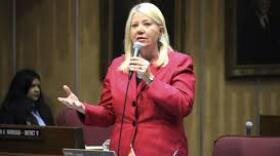The new Arizona Science Standards, meant to guide K-12 science curriculum, have been plagued with controversy for their treatment of evolution. The Arizona Department of Education spent more than a year convening committees to hammer out language everyone can agree on. The latest version will be presented to the Board of Education on Monday—but in an unexpected move, the Superintendent of Public Instruction has already decided not to recommend it. KNAU’s Melissa Sevigny reports.
In an unprecedented internal review last March, Department of Education staff made changes to the newly drafted Arizona Science Standards which many believed weakened the concept of evolution. Thousands of public comments flooded in. Glenn Branch of the National Center for Science Education says the process left Arizona with a bad reputation. "Basically the state let people downplay evolution, downplay climate change, and cheated Arizona’s public school students of a chance to attain scientific literacy."
Following the criticism, the Department of Education convened an 8-person committee to revise the evolution language. That panel included Joseph Kezele, president of the Arizona Origin Science Association which promotes creationist views. That raised red flags for Branch.
"So someone who has long standing, deeply held ideological opposition to evolution….For the Department to select someone who is a creationist specifically to do the evolution oriented tasks strikes me as very strange indeed," Branch says.
Kezele declined KNAU’s request for an interview. But the Department of Education’s chief of staff Michael Bradley defended the decision. He says, "We don’t want to include religion in science, but we also don’t want to be anti-religion in science either…. So we just wanted a balance."
The committee rewrote the evolution standard three weeks ago. But now the Department has withdrawn its support from the document. On Monday, Superintendent Diane Douglas plans to recommend a charter school curriculum written by Hillsdale College in Michigan. Hillsdale is a Christian institution but its science curriculum does include evolution. Bradley says Douglas prefers it to the Arizona Science Standards because it’s more “specific,” but did not elaborate.
He says, "I think she’s been frustrated with the test scores, and feels like there’s needs to be much more robust standards than what’s been developed by the community."
Barry Roth is one of the people who helped write the Arizona Science Standards. He’s an education professor at the University of Arizona. Roth says he was “dumbfounded” by the news. He believes Douglas is walking away from the hard work of dozens of science educators, "and what I believe is probably hundreds of thousands of taxpayer dollars that went into this process—if she wants to abandon that, I find that a little bit disturbing."
Roth says the curriculum Douglas now supports, from Hillsdale College, is “antiquated.” He says, "It goes back to the old school explanation of science being a body of facts, and that’s what’s she proposing, that’s what she wants."
Roth thinks the best-case scenario would be for the Board of Education to adopt the Next Generation Science Standards, developed by a collaboration of 26 states including Arizona. But he says that won’t happen, because Arizona chose years ago to write its own standards instead. Now, Roth just hopes that document won’t be pushed aside.








